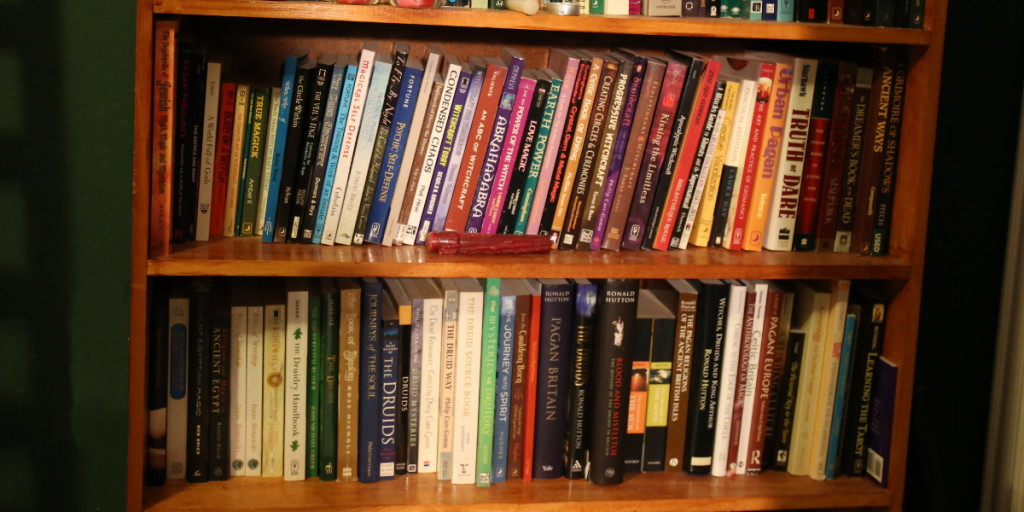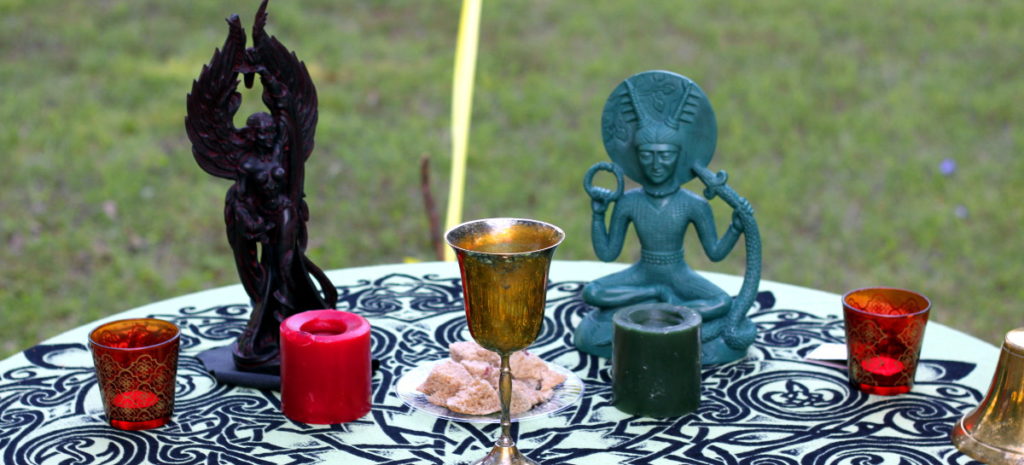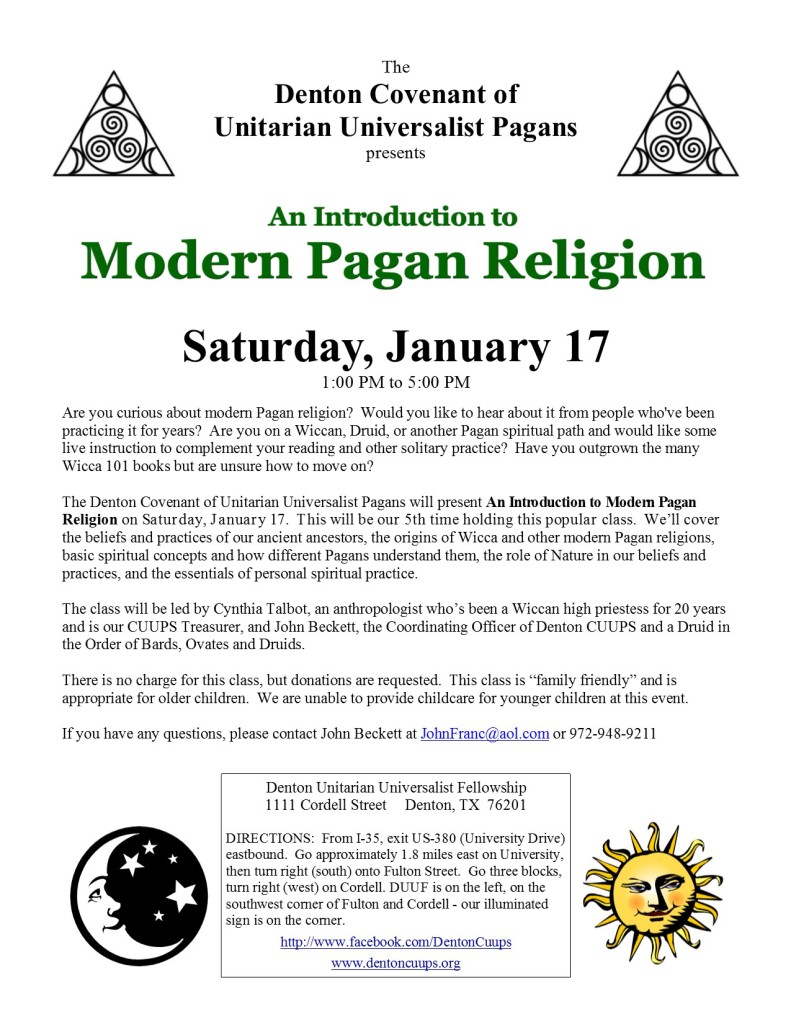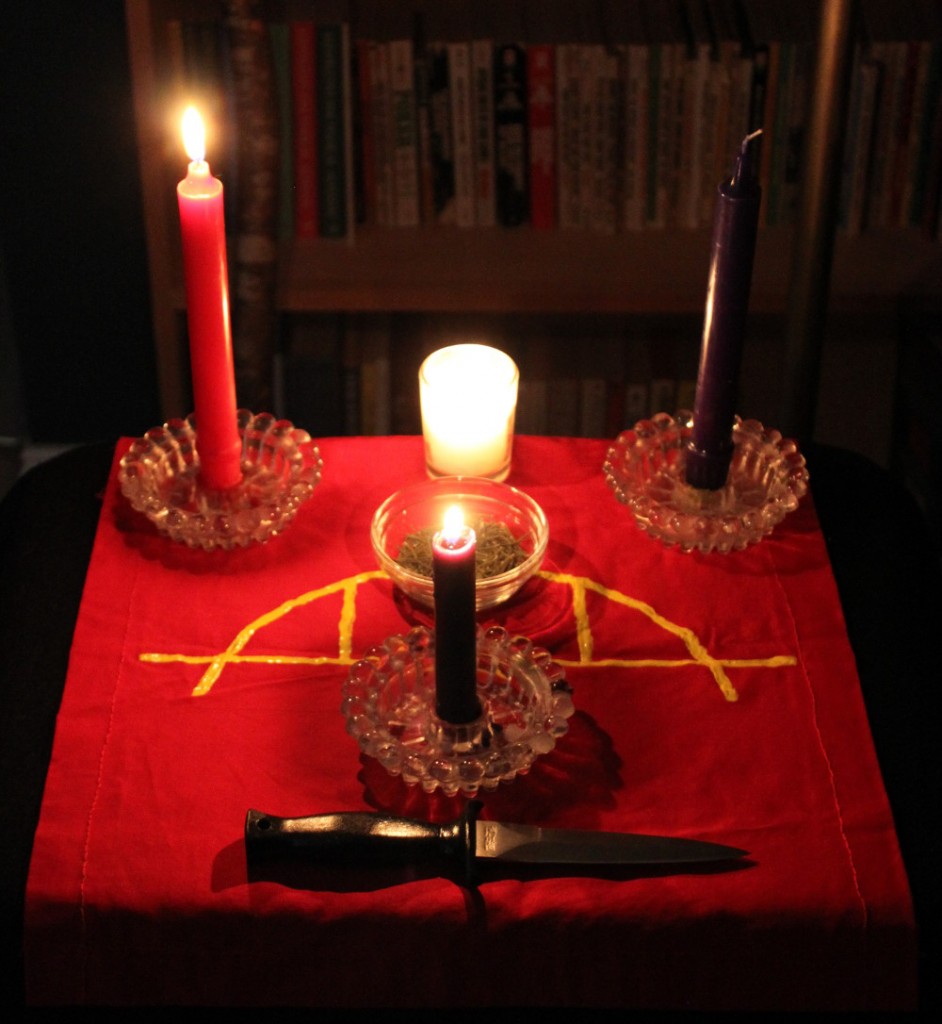Here’s the recommended reading list from today’s Introduction to Modern Pagan Religion class. If you’re looking for something that’s not on this list, leave a question in the comments and we’ll see what we can dig up.
 Basics
Basics
Wicca, A Guide for the Solitary Practitioner – Scott Cunningham. Start here. This was recommended to me when I started 20 years ago and it’s still the best introduction there is. It’s written from a Wiccan perspective, but 98% of it is applicable to any Neopagan path. Easy to read, easy to understand, and most importantly, easy to put into practice.
The Spiral Dance – Starhawk. Another classic of contemporary Paganism. I found her approach to be too radically political for my center-left tastes, but I’ve been told the 20th Anniversary Edition has commentary that tones some of that down. Politics aside, the rituals in Spiral Dance are excellent and are great to use either as is or as a guide for writing your own.
Creative Visualization – Shakti Gawain. This is a “New Age” book rather than Pagan (old joke – Q: what’s the difference between New Age and Pagan? A: one decimal place in the price), but it does a very good job of teaching visualization skills, which are essential for performing magic. Short, to the point, and effective.
Witch Crafting: A Spiritual Guide to Making Magic – Phyllis W. Currott. An introductory book on Wicca that is also helpful for the intermediate practitioner.
Seeking the Mystery: An Introduction to Pagan Theologies – Christine Kraemer. A very good introduction to what Pagans believe, and also an explanation of common theological terms and schools of thought from a Pagan perspective. John’s review of it is here.
Ritual
Neopagan Rites: A Guide to Creating Public Rituals that Work – Isaac Bonewits. I have the first edition, titled Rites of Worship. Isaac writes from a Wiccan/Druid perspective, but the concepts and processes he describes will work in just about any religious setting. If you want to understand why some religious services leave you energized and others put you to sleep, read this book.
The Elements of Ritual – Deborah Lipp. This is written from a traditional Wiccan perspective, but Wicca has influenced most modern Pagan traditions (for good and for ill), so it’s applicable to most of us. Lipp does an excellent job of deconstructing Wiccan liturgy and explaining the symbolism in it – I particularly like her description of the traditional circle casting as a ritual re-enactment of the Creation of the Universe. Interestingly, Lipp is Isaac Bonewits’ ex-wife.
Personal Practice
The Circle Within – Dianne Sylvan. There are very few books on Pagan personal practice – this is the best of them. It covers relationships with deities, ethics, meditation, and personal rituals. Paganism is more than the eight sabbats and the full and new moons – this book helps you figure out what to do every day.
The Veil’s Edge – Willow Polson. This book nominally deals with the Veil Between the Worlds, but its real value is in presenting a magical worldview in a way that is easy to understand and easy to put into practice. If What the Bleep Do We Know? had been written by Pagans, this is what it would look like. I led a group study of this book a few years back – it was very helpful. I’ve still got my outline if anybody wants it.
The Way of the Shaman – Michael Harner. This is the classic text on “core shamanism,” the processes and techniques common to most shamanic traditions. Shamanism can be a practice all its own, but as with visualization, the techniques are very helpful in working magic and communing with deities.
Classics
The Power of Myth – Joseph Campbell. The book is good, the 6-hour videos/DVDs are better. This began in 1988 as a PBS special, with Bill Moyers interviewing Campbell about his work and his views on mythology, which focus on universal themes found in myths around the world. PBS still shows this occasionally, especially at pledge drive time.
Witchcraft Today – Gerald Gardner. The Witchcraft Act wasn’t repealed in Britain until 1951. In 1954, Gardner wrote this book presenting Wicca – the religion of witchcraft – to the mundane world. Yes, some of Gardner’s stories about the roots and origins of Wicca were more fantasy than fact, but this book is a good look at the early years of Wicca. We’ve come a long way.
Witchcraft For Tomorrow – Doreen Valiente. Valiente was one of Gardner’s high priestesses and a superb writer. She’s largely responsible for reworking The Charge of the Goddess into the beautiful poetry we have today. Lots of interesting historical information, and the spells, rituals, and poetry are classics.
The Mabinogion. This is the classic collection of Welsh myths. They weren’t written down until well into the medieval period, meaning they’ve been thoroughly Christianized. But the original Celtic heroes, deities, stories and concepts are still easy to follow. The version I have is translated by Patrick K. Ford.
The Norse Myths – Kevin Crossley-Holland. This is a translation of the Prose Edda, the collection of Norse myths written down in the 13th century by Icelander Snorri Sturluson. These stories are as much a part of our Anglo-Saxon cultural heritage as the Celtic myths of The Mabinogion. JRR Tolkien drew heavily on them in writing his Middle Earth novels.
History
The Book of English Magic – Philip Carr-Gomm. A magical travelogue – a guidebook describing the important places to go, history to investigate, people to get to know, and sights to see. It doesn’t give you an in-depth look at any of them, but it does tell you enough for you to figure out what you want to do first and what can wait for later. John’s review of it is here.
The Triumph of the Moon – Ronald Hutton. Every Wiccan, Druid, Heathen, and other modern Pagan needs to read this book. Hutton is Professor of History at the University of Bristol in England – this is a serious look at the origins and development of Wicca, and through it (directly or indirectly), most other modern Pagan traditions. The book is literally hard to read – it’s printed in 8-point type. But if you want to separate the truth of the origins of modern Paganism from the fantasy, misinformation, and outright lies, you need to read this book.
The Great Transformation – Karen Armstrong. This book has very little to do with ancient paganism and nothing to do with modern Paganism. It’s Armstrong’s history of the Axial Age, the relatively short period about 2600 years ago when several major religions were founded/developed, including Confucianism, Taoism, Buddhism, and Judaism. For those coming to Paganism from the monotheistic religions, The Great Transformationdoes a good job of explaining the religious history nobody taught in Sunday School. And it reminds us that all religions – old or new – need a strong this-world ethical component. If you want something that focuses solely on the three Western monotheistic religions, try Armstrong’s A History of God.






